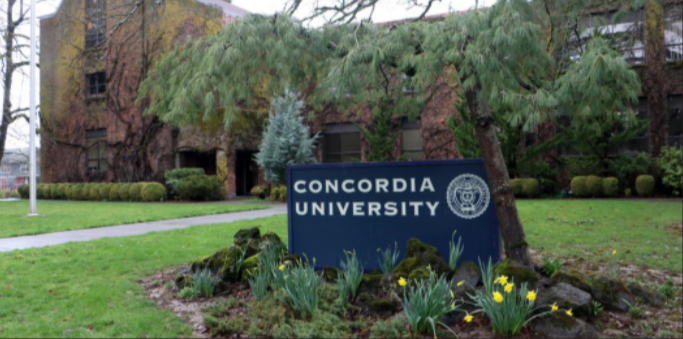
Similar to the United States, Europe offers a plethora of options for higher education. Grant High School alumni have chosen to attend universities across the Atlantic such as the University of Groningen (UG), a large public university in the Netherlands, and Anglo-American University (AAU), a small private university in Prague, Czech Republic.
Lucas Nimelman, who graduated from Grant in 2019 and is currently studying at AAU, encourages Grant students to consider attending an international university. He says, “Take the leap of faith. No decision is final. You can always go home, so there’s no reason not to try if it’s what you want to do.”
If you are interested in a large university in a college town, look no further than UG. Located in the Dutch college town of Groningen, about two and a half hours northeast of Amsterdam, bikers can be found weaving between UG’s mix of ornate brick buildings and modern facilities. Currently, Groningen has around 30,000 undergraduate students, nearly 9,900 of them international.
Looking for a life-altering experience, Grant alumna Isabella Earhart chose to further her education at UG. “The friend groups that are created in an international community are so vibrant and full of people from different walks of life, with vastly different perspectives on the world,” Earhart says.
According to the U.S. News & World Report, Groningen is ranked the 88th best global university. In just three years, students can acquire a bachelor’s degree from one of UG’s 45 undergraduate programs, 37 of which are taught in English.
To be admitted, applicants must have a high school diploma equivalent to a Dutch education, which can be met with an IB diploma, three Advanced Placement test scores of a three or higher and a 3.0 GPA or one year’s worth of college credits. Additional application criteria
can be found on the university’s website.
If an international student meets UG’s admission criteria, they will automatically be accepted into the university. However, they will be weeded out in other ways once they arrive on campus, particularly by way of housing availability and meeting academic benchmarks
throughout the school year.
Housing in Groningen is very difficult to obtain, as the school does not offer any on-campus dormitories. UG recommends searching for housing as soon as you become interested in the school. The first year of study at UG is an evaluation — if a student does not pass 75% of their classes, they will not be able to continue. That said, the school offers study advisors to support students. Study advisors monitor grades at the end of each nine-week semester block to provide resources for students who may need additional aid. Earhart says, “Advice I would give is to go in with an open mind and an appetite to learn.”
In recent years, international students have been flooding schools in the Netherlands. This has put pressure on the education minister, Robbert Dijkgraaf, to tackle the growing number of international students attending Dutch universities. In April 2023, Dijkgraaf introduced new legislation that would require two-thirds of the university coursework necessary to obtain a degree to be taught in Dutch. If the legislation passes, it will become law in 2025.
In the U.S. a good comparison to UG is Oregon State University (OSU) in Corvallis, Oregon. According to its website, OSU currently has 29,945 undergraduate students, making it of comparable size to UG. Both schools are also located in college towns. However, in order to achieve a bachelor’s degree at OSU, the school requires four years of study compared to the three years required at UG. The most notable difference between the two is the cost: Four years of study at OSU costs around $113,000 without any financial aid; three years at UG costs about $65,000 for a non-EU citizen (not including travel costs). This estimate includes tuition, food and rent.
If you prefer a much smaller private institution, AAU is a great option. Nimelman says, “Studying in Europe has broadened my horizons and given meconfidence in myself to be able to adapt to new environments and experiences.”
AAU boasts small classes, peacock-filled gardens, proximity to the famous Charles Bridge and a backdrop of the Prague castle. With a population of about 700 undergraduate students, AAU is a small haven within Prague’s population of 1.3 million people.

At AAU, all classes are taught in English, and the university offers 30 different bachelor’s degrees that can be acquired after three years of studying. Currently, AAU is not ranked in the U.S. News & World Report’s list of colleges.
The AAU application process requires a personal statement, an interview, a high school diploma and your high school transcript. There is an 80% acceptance rate for international students. More information can be found on the university’s website.
AAU provides dormitories for students and recommends first-year students to stay there, as it is a great way to meet other students and an easier way to process visas. However, the dorms are more expensive than some apartments in the city. As they become accustomed to living in Prague, many AAU students choose to rent their own housing.
Lewis & Clark College is a private liberal arts college located in Portland, Oregon, that matches AAU in size. Overall, the costs for tuition, food and rent for four years at Lewis & Clark costs around $285,000 without financial aid. At AAU three years of tuition, food and rent costs about $52,000 for a non-EU citizen (not including travel costs).
While there are many benefits to studying at schools like UG and AAU, there are numerous difficulties that arise from studying abroad. Many European colleges, including UG, do not accept funds from 529 college savings accounts. Moreover, dealing with a language barrier and studying far from friends and family can be challenging for international students. “Being that far from family, and moving to a country
where you don’t know a single person, is terrifying. But the amount you will grow as a person and learn about yourself is, in my opinion, almost unparalleled to any experience you could have in the states,” says Earhart.
To students interested in studying abroad, the website Beyond the States is a good resource, and Grant’s College & Career Center can offer support in international applications.
Nimelman says it best: “If you have any desire to study abroad, whether in Europe or another continent, follow that inclination as far as you can.”







































